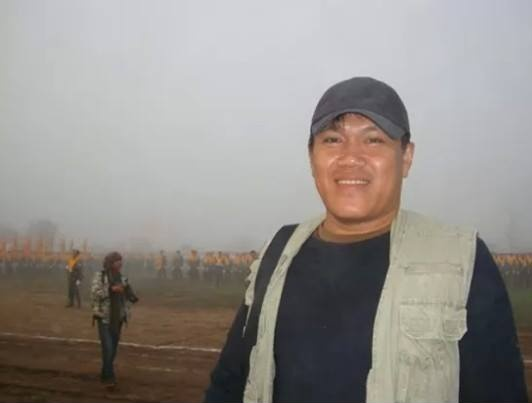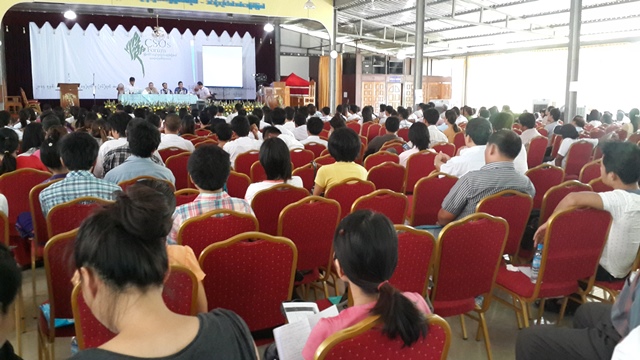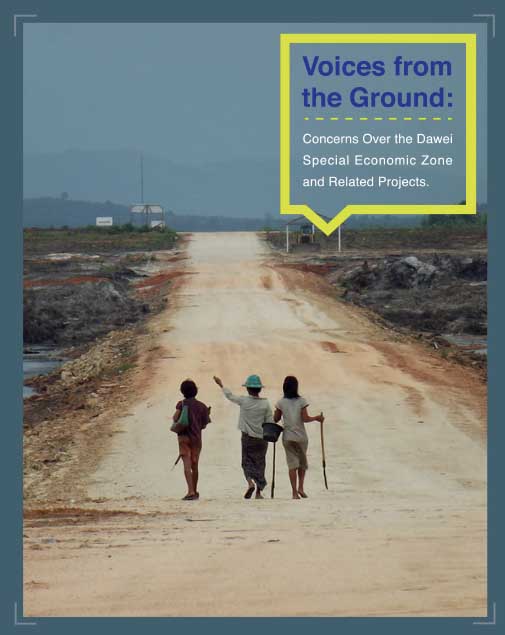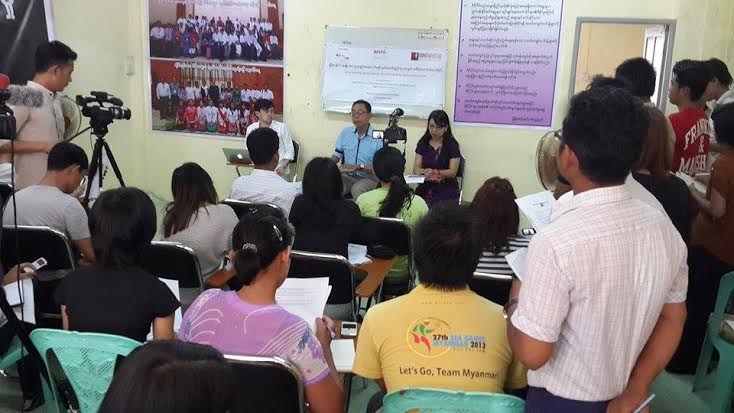Posts Tagged ‘Myanmar National Human Rights Commission’ (136 found)
Myanmar: Further Information: Activist Organization Targeted again
Two members of the Movement for Democracy Current Force (MDCF) have been given jail terms for peacefully exercising their rights to freedom of expression and peaceful assembly. They must be immediately and unconditionally released. Charges against a third person, who is married to one of the MDCF members and was exercising her right to peaceful protest, should be dropped […]
• • •Justice for the Killing of Journalist by Burma Army Must be Found
 News of the murder of a journalist by the Burma Army while being held in custody should send shockwaves across the country and beyond, but sadly it is not much of a surprise for those who are aware of the abusive nature of the most powerful institution in Burma. What will transpire next will be a clear indicator of the Government’s will to pursue justice and end the impunity that the Burma Army has enjoyed for so long. Not many are optimistic.
News of the murder of a journalist by the Burma Army while being held in custody should send shockwaves across the country and beyond, but sadly it is not much of a surprise for those who are aware of the abusive nature of the most powerful institution in Burma. What will transpire next will be a clear indicator of the Government’s will to pursue justice and end the impunity that the Burma Army has enjoyed for so long. Not many are optimistic.
Aung Kyaw Naing, also known as Ko Par Gyi, was a freelance journalist covering the recent clashes in eastern Burma between the Democratic Karen Benevolent Army (DKBA) and the Burma Army and its’ proxy Border Guard Force (BGF). After visiting Kyaikmayaw, Mon State, the scene of heavy clashes in September 2014, Ko Par Gyi went missing. His wife, Ma Than Dar, began to search for him and held a press conference on 21 October in Rangoon stating that he was being held in custody by the Burma Army and demanded his immediate release. Just a few days later, a statement was issued to the Myanmar Press Council (Interim) by an aide to commander-in-chief of the armed forces, Min Aung Hlaing, that detailed Ko Par Gyi’s death while in custody. The statement claims that Ko Par Gyi was a captain for the Klohtoobaw Karen Organization (KKO), the political wing of the DKBA, and was shot dead while trying to escape. The DKBA has denied that Ko Par Gyi was indeed a member of their organization […]
• • •Myanmar: UNGA Resolution Must Address Backtracking on Human Rights
As the new UN Special Rapporteur on the situation of human rights in Myanmar, Yanghee Lee, today presents her first report to the 69thsession of the UN General Assembly (UNGA), Amnesty International calls on the UNGA to adopt a resolution on the country which addresses the government’s backtracking on human rights […]
• • •BURMA: Killing of Mr. Aung Kyaw Naing
The Observatory for the Protection of Human Rights Defenders, a joint programme of the International Federation for Human Rights (FIDH) and the World Organisation Against Torture (OMCT), requests your urgent intervention in the following situation in Burma […]
• • •Over 650 Myanmar/Burma Civil Society Actors Speak Out on the Reality of the Transition
 The forum titled, “Civil Societies’ Review on Myanmar/Burma’s Transition Process: Prospects for 2015 and Beyond”, held on 15 – 17 October 2014 at the Myanmar Christian Fellowship of the Blind Center in Rangoon, brought together over 650 representatives from 257 organizations and networks from across the country and border areas to discuss and strategize a wide range of key issues currently facing Burma in the context of the recent economic and political reforms since 2011. This is the first forum of this scale to assess the reform and the wide range of problems currently facing Burma.
The forum titled, “Civil Societies’ Review on Myanmar/Burma’s Transition Process: Prospects for 2015 and Beyond”, held on 15 – 17 October 2014 at the Myanmar Christian Fellowship of the Blind Center in Rangoon, brought together over 650 representatives from 257 organizations and networks from across the country and border areas to discuss and strategize a wide range of key issues currently facing Burma in the context of the recent economic and political reforms since 2011. This is the first forum of this scale to assess the reform and the wide range of problems currently facing Burma.
Despite the hailed “transition to democracy,” exalted particularly by the international community, civil society organizations (CSOs) spoke of the decades old challenges that remain unresolved, the stagnation of the reform process, and new emerging issues, in addition to the need for meaningful inclusion of the voices of civil society, democratic opposition forces, ethnic peoples, women and youth in the reform process.
The forum addressed six core issues; (1) law reform, (2) peace and conflict, (3) media, hate speech and communal violence, (4) Parliament, Government and accountability, (5) economic reform and foreign direct investment, and (6) the international community’s role and involvement, which were discussed under six panel discussions and six workshops. The forum produced a statement that gave concrete recommendations from civil society groups to the Burma Government, United Nations, international governments and international non-governmental organizations (lNGOs) […]
• • •Voices from the Ground: Concerns over the Dawei Special Economic Zone and Related Projects
 The report “Voices from the Ground: Concerns over the Dawei Special Economic Zone and Related Projects” calls on the National Human Rights Commissions of Thailand and Myanmar to collaborate and carry out a full investigation into all complaints of human rights abuses, relating to land confiscations and forced evictions as a consequence of the Dawei SEZ project activities or operations conducted by companies domiciled in Thailand or Myanmar.
The report “Voices from the Ground: Concerns over the Dawei Special Economic Zone and Related Projects” calls on the National Human Rights Commissions of Thailand and Myanmar to collaborate and carry out a full investigation into all complaints of human rights abuses, relating to land confiscations and forced evictions as a consequence of the Dawei SEZ project activities or operations conducted by companies domiciled in Thailand or Myanmar.
Local Communities from Dawei Call for Human Rights Violations to be Addressed in Special Economic Zone
Bangkok, Thailand – Community representatives from areas affected by the Dawei Special Economic Zone (DSEZ) questioned today how the mega-project could go ahead when so many social and environmental impacts and human rights violations have already taken place that have not been addressed. These problems need to be resolved first, before considering a new phase to this already problematic project […]
• • •Statement: Civil Societies’ Review on Myanmar’s Transition Process: Prospects for 2015 and Beyond
We, more than 650 representatives from 257 organizations and networks in Myanmar, came together in Yangon for 3 days from 14-16 October 2014 to exchange opinions, debate and to assess a wide range of issues currently confronting Myanmar in the context of recent political developments and the transition process that started in 2011 […]
• • •Document – Myanmar: Media Workers Jailed for Two Years
Five media workers have been sentenced to two years in prison in Myanmar over the publication of a news story. They are prisoners of conscience, detained solely for peacefully exercising their right to freedom of expression […]
• • •The Myanmar National Human Rights Commission Continues Failing to Deliver
 A report authored by Burma Partnership and Equality Myanmar was launched on 25 September 2014 in Rangoon revealing the continuing ineffectiveness of the Myanmar National Human Rights Commission (MNHRC) as well as the lack of independence from the government. The report was launched on the same day that a reshuffle of the members of MNHRC was announced by the government, which came as a complete surprise to civil society organizations due to the lack of consultation.
A report authored by Burma Partnership and Equality Myanmar was launched on 25 September 2014 in Rangoon revealing the continuing ineffectiveness of the Myanmar National Human Rights Commission (MNHRC) as well as the lack of independence from the government. The report was launched on the same day that a reshuffle of the members of MNHRC was announced by the government, which came as a complete surprise to civil society organizations due to the lack of consultation.
Released at the Myanmar Journalists Network in Rangoon, Burma: All the President’s Men, contributed to the annual Asian NGO Network on National Human Rights Institutions (ANNI) Report on the Performance and Establishment of National Human Rights Institutions in Asia (2014). The report analyzes the Myanmar National Human Rights Commission Law 2014 enacted in March this year (enabling law) that institutionalizes the mandate of the MNHRC. The report finds that the law does not guarantee independence from the government and in particular, the president’s office. In contravention of international standards on national human rights institutions, namely the Paris Principles, the selection process does not adequately consult with civil society. As the report points out, “It is up to the selection board to come up with procedures for short-listing candidates, yet the enabling law itself should set out the process/procedure for selection, with consultations with civil society.” The members of the MNHRC are actually chosen by a selection board of ten, five of which are from the government or are government-affiliated. The enabling law states that two members of this board are to come from civil society organizations and a further two are to be MP, yet there is no transparency regarding the procedures under which the two MPs are chosen. Additionally, the chosen civil society members to the selection board are restricted to registered civil society only, thus excluding many outspoken and critical political and human rights groups who feel they cannot register under the current climate […]
• • •








 All posts
All posts